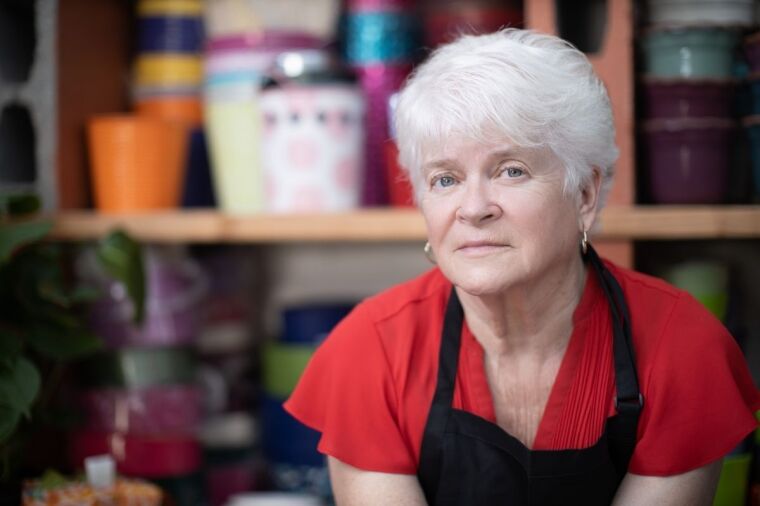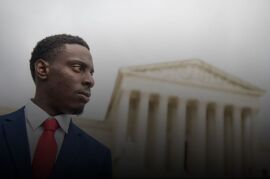Floral Artist’s Legal Case is Over But She’s Passing Legacy on to Other Creative Professionals

After almost a decade, Washington floral artist Barronelle Stutzman has ended her legal battle on her own terms. “I am willing to turn the legal struggle for freedom over to others. At age 77, it’s time to retire” she wrote in an open letter.
But why was this seventy-seven-year-old grandmother in court in the first place? Well, because she—like many creative professionals across the country—simply wanted to create art consistently with her deeply held religious beliefs.
Artists know that everything they create contains a piece of themselves. Art is a form of communication that requires the creator to be present as a whole person.
Asking an artist to create messages with their art that they don’t agree with is asking them to be dishonest. And asking anyone to speak a message that is against their beliefs is a violation of the First Amendment of the Constitution.
Barronelle fought for Americans’ constitutional right to believe and speak freely for nearly 10 years.
Now, she is leaving the legal battle to another creative professional—web designer, Lorie Smith.
As Barronelle put it: “[I] am passing my legal torch on to other artists—like Lorie Smith of 303 Creative in Colorado, whose case may well be heard by the U.S. Supreme Court this term—and thanking God for the victories He’s so graciously given me.”
Do you want to help Alliance Defending Freedom protect your First Amendment Freedoms? Click here.

Barronelle’s Story
You may have already heard of Barronelle.
She owned a small flower shop in Richland, Washington called Arlene’s Flowers. It’s because of something that happened in this shop that “Barronelle” became a household name.
In 2012, Barronelle’s longtime customer, Rob Ingersoll, asked her to create a custom floral arrangement for his same-sex wedding ceremony.
Barronelle knew that Rob was in a same-sex relationship. It never bothered her. She loved working with Rob because he often asked for out-of-the-box ideas that Barronelle loved to use her artistic skills to create.
But creating arrangements for a same-sex wedding was something different. As a devout Christian, Barronelle believes that marriage is the sacred union between one man and one woman. She also puts her heart and soul into her custom floral arrangements. She knew that creating arrangements for a same-sex wedding would violate her conscience.
She served everyone—she served Rob for almost a decade—but, as a creative professional, she could not create all messages.
So, Barronelle had a heart-to-heart conversation with Rob in a quiet corner of her shop, gently explaining that she could not fulfil his request and referring him to several other florists in the area that would do a great job. The two hugged and Rob left the shop.
That’s when the state of Washington and the American Civil Liberties Union got involved.
The Washington Attorney General heard about Barronelle’s decision through news reports generated by a social media post. Without anyone filing a complaint, he decided to file a lawsuit against Barronelle in her personal and professional capacity.
Suddenly, because she referred one request, Barronelle was being sued for nearly everything she owned—including her retirement money—by the government.
This was clearly a violation of Barronelle’s constitutional rights. With the help of Alliance Defending Freedom attorneys, Barronelle fought these attacks in court.
She asked the U.S. Supreme Court to hear her case twice.
The first time, the Court sent her case back to the Washington Supreme Court to be redecided in light of its decision in Masterpiece Cakeshop v. Colorado Civil Rights Commission. But the Washington Supreme Court came back with virtually the same decision it made in the first place, ignoring Barronelle’s rights.
In 2019, Barronelle asked the Supreme Court once again to take her case. But the Court declined in July 2021.
With her husband Darold by her side, Barronelle bravely fought for the constitutional rights of creative professionals since 2013. In November 2021, Barronelle settled her case with her conscience intact.
Now it’s time to pass the torch on to others to continue the legal battle.
Help continue Barronelle’s fight for freedom by giving to Alliance Defending Freedom today.
Lorie Will Continue Barronelle’s Fight

Barronelle and Lorie Smith seem like totally different women.
One is a floral artist who works with flowers, while the other is a web designer who uses a computer to create her art. One lives in Washington while the other lives hundreds of miles away in Colorado.
But both Barronelle and Lorie are passionate about their art and strong in their convictions.
When it comes to protecting her freedom to create according to her beliefs, Lorie is willing to take a stand just like Barronelle has done.
Lorie designs websites and graphics for everyone. But, like Barronelle, she cannot create all messages.
Colorado’s public-accommodation law threatens to punish Lorie for not creating wedding websites celebrating same-sex ceremonies if she does so for weddings between one man and one woman. (If this sounds familiar to you, it’s because this law is the same one that the Colorado Civil Rights Commission used to target cake artist Jack Phillips, prosecuting him all the way to the U.S. Supreme Court)
Shockingly, in 2021, the Tenth Circuit Court of Appeals ruled against Lorie’s First Amendment freedoms.
Now, Lorie is asking the U.S. Supreme Court to hear her case and overturn this ruling and protect the freedom of speech for all creative professionals.
“The 10th Circuit’s reasoning turns free-speech protections on their head by saying that the more ‘unique’ speech is, the more the government can compel it.” said ADF General Counsel Kristen Waggoner. “That kind of dangerous, unconstitutional reasoning is why we have asked the Supreme Court to take Lorie’s case.”
Lorie is picking up right where Barronelle left off.
In many ways, Barronelle’s legal battle paved the way for creative professionals like Lorie to seek protections for their God-given rights in court.
Her case and her countless hours speaking up for her beliefs in the media set a precedent and sent a message: The First Amendment Freedoms of artists must be protected.
Alliance Defending Freedom is proud to have represented Barronelle for the better part of a decade. We are dedicated to honoring her legacy by continuing to stand for First Amendment freedoms. But we need your help. As a nonprofit, ADF does not charge a dime for its legal services. Will you give today to help us represent more creative professionals like Lorie and Barronelle?





